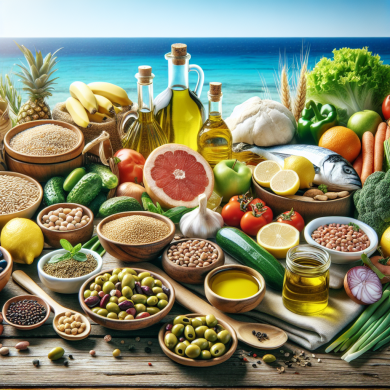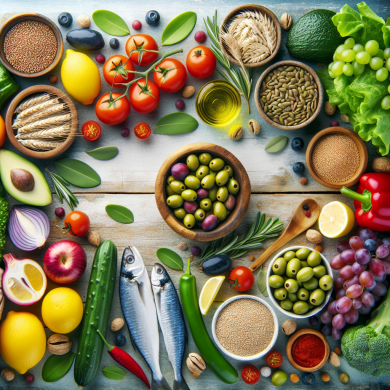Top Mediterranean Diet Snacks for Healthy Eating
Introduction to the Mediterranean Diet
The Mediterranean diet is celebrated worldwide for its health benefits, which include improved heart health, better weight management, and an overall increase in life expectancy. Rooted in the traditional eating habits of countries bordering the Mediterranean Sea, this diet emphasizes whole grains, fruits, vegetables, lean proteins, and healthy fats, particularly olive oil. It is not just a diet but a lifestyle choice that incorporates physical activity and social connections alongside wholesome eating.
The Importance of Snacking
Snacking often gets a bad reputation, but when done correctly, it can be an essential component of a balanced diet. Healthy snacks can provide energy, prevent overeating at mealtimes, and supply important nutrients that might be missing from your main meals. The key is to choose snacks that align with your dietary goals, such as those found in the Mediterranean diet.
Characteristics of Mediterranean Diet Snacks
Snacks within the Mediterranean diet framework are typically rich in fiber, healthy fats, and protein. They should ideally be made from whole, minimally processed foods and should reflect the diet’s emphasis on plant-based ingredients. Portion control is also important, as even healthy snacks can contribute to excess calorie intake if not consumed in moderation.
Top Mediterranean Diet Snacks
1. Hummus and Vegetables
Hummus, a creamy spread made from chickpeas, tahini, olive oil, garlic, and lemon juice, is a staple in the Mediterranean diet. It is rich in protein and fiber, making it a satisfying and nutritious snack. Pair hummus with a variety of fresh vegetables such as carrots, cucumbers, and bell peppers for a crunchy, colorful, and nutrient-dense snack.
2. Greek Yogurt with Honey and Nuts
Greek yogurt is thicker and creamier than regular yogurt and provides a good source of protein and probiotics, which are essential for gut health. Top it with a drizzle of honey, which is rich in antioxidants, and a handful of nuts like almonds or walnuts to add healthy fats and a satisfying crunch. This snack is not only nutritious but also indulgently delicious.
3. Olives and Cheese
Olives are a quintessential Mediterranean food, high in heart-healthy monounsaturated fats. Pairing them with a small serving of cheese, such as feta or halloumi, makes for a savory snack that is both satisfying and rich in flavor. Choose cheese in moderation to keep saturated fat intake in check.
4. Fruit and Nut Bars
Homemade or carefully selected store-bought fruit and nut bars can be a great on-the-go snack option. Look for bars that contain minimal added sugars and are made primarily from whole ingredients like dates, almonds, and other nuts. These bars are portable, making them ideal for busy days.
5. Whole Grain Crackers with Avocado Spread
Whole grain crackers provide fiber and complex carbohydrates, while avocado offers healthy fats and a creamy texture. Mash the avocado with a bit of lime juice, salt, and pepper for a quick, nutritious spread. This combination makes for a balanced snack that can keep you satiated between meals.
6. Roasted Chickpeas
Chickpeas are a versatile legume that can be roasted with spices for a crispy, protein-packed snack. Season them with a mix of Mediterranean spices such as paprika, cumin, and garlic powder. Roasting chickpeas transforms them into a crunchy delight that’s easy to make and even easier to enjoy.
7. Fresh Fruit Salad
A fresh fruit salad can be both refreshing and satisfying. Opt for a mix of seasonal fruits like apples, grapes, berries, and oranges. This snack is naturally sweet and provides a variety of vitamins, minerals, and antioxidants. For an added touch, sprinkle some chopped mint leaves or a squeeze of lemon juice.
8. Dark Chocolate and Almonds
For those with a sweet tooth, a small portion of dark chocolate paired with almonds can be a perfect snack. Dark chocolate is rich in antioxidants, while almonds provide healthy fats and protein. Choose chocolate that is at least 70% cocoa to maximize health benefits.
Benefits of Mediterranean Diet Snacks
Incorporating these Mediterranean-inspired snacks into your diet can offer numerous health advantages. These snacks are typically nutrient-dense, providing essential vitamins and minerals, healthy fats, and fiber, all of which contribute to overall health. They can aid in weight management by helping control hunger and preventing overeating at subsequent meals. Moreover, they often contain ingredients that support heart health, such as olive oil, nuts, and fruits.
Tips for Incorporating Mediterranean Snacks into Your Diet
Here are some practical tips to help you incorporate these snacks into your daily routine:
- Plan Ahead: Prepare snacks in advance to ensure you have healthy options readily available. This can prevent the temptation to reach for less nutritious convenience foods.
- Portion Control: Pay attention to portion sizes to avoid consuming excess calories. Use small containers or snack bags to pre-portion foods.
- Variety is Key: Rotate your snacks to include a wide range of nutrients and prevent monotony.
- Mindful Eating: Take the time to enjoy your snacks without distractions, focusing on the flavors and textures.
- Stay Hydrated: Often, we mistake thirst for hunger. Ensure you are drinking enough water throughout the day.
Conclusion
The Mediterranean diet is not only about meals but also about smart snacking that complements a healthy lifestyle. By choosing snacks that are aligned with the principles of this diet, you can enjoy delicious, satisfying, and nutritious options that support your overall well-being. Whether you’re at home, at work, or on the go, these Mediterranean diet snacks can help you maintain a balanced diet and promote long-term health benefits.















Add comment